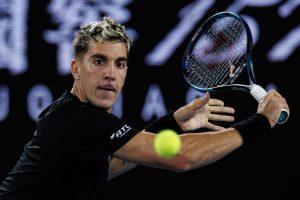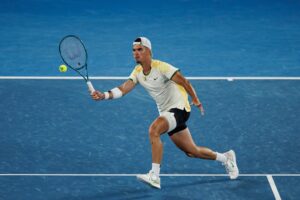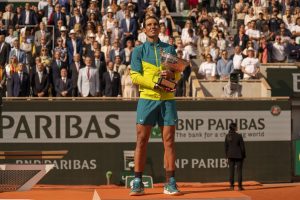For Novak Djokovic and his fans, the outcome of the Italian Open final was an ominous sign heading into the French Open. The world #1, after battling into the title-match, was dismantled by defending champion Rafael Nadal in the first set, failing to win a single game as Nadal claimed the first bagel set of their epic 54 match rivalry. Somehow, by sheer force of will, Djokovic made a contest of the second set, fending off Nadal with some excellent spot serving and delivering some telling blows with his forehand.
Nadal, it is worth noting, began to wilt somewhat in the face of his opponent’s renewed resistance. The Spaniard is typically relentlessly confident on his beloved clay, but he hadn’t yet won a title all season and Djokovic can give him pause like no other. The 6-3 6-2 6-3 humbling he suffered at the hands of the Serbian at Melbourne Park in January appeared to be on his mind. And Djokovic, unusually, had the fulsome backing of the crowd.
He broke late to take the match the distance and it looked like one of the most astonishing comebacks of the season, if not of all-time, might just be on the cards. But then Djokovic’s level wavered. All match, he had been struggling with overhead smashes, his tired legs failing to propel him up to meet the ball. Up game point in the first game of the set, he sent one tamely back to Nadal, who punished his mistake with trademark ruthlessness. Djokovic’s fleeting chance was gone.
Nadal had his man in the dust and this time he had no intention of allowing him to rise. Djokovic’s pride allowed him to avoid another bagel, but his leaden legs denied him the chance to offer any real resistance. Nadal brushed aside his defences with ease to claim the title and restore his position as the heavy favourite going into the French Open, where he has won 11 titles to Djokovic’s one.
The lesson to be taken from that final in Rome is not that Djokovic cannot beat Nadal in Paris. He has done it once before, albeit against a lessened Nadal, and has come closer than any other player to breaking Nadal’s monopoly in the French capital. Indeed, Djokovic has a game that almost seems built to counter the great Spaniard. No one defends better out of the forehand corner than Djokovic, who can absorb tremendous power into that wing. His two-hander is better equipped than any other backhand in the game to take the sting out of Nadal’s rearing topspin forehands.
And he can land telling blows of his own. His serve is better than Nadal’s and his short, angled forehand and down the line backhand provide him with a deadly one-two punch that can strain even Nadal’s rightly vaunted defensive abilities. When he is fresh, he has the stamina and physicality to go toe-to-toe with Nadal over the entire distance of a five-set match and, more often than not, land the knockout blow at the end of it.
But he does not play his best tennis on a clay court. Make no mistake, even not at his very best, Djokovic is a formidable clay courter who can beat almost anyone on the red dirt. But as was made clear at the Italian Open, he cannot beat them as easily as Nadal can. Whilst the Spaniard raced through his quarterfinal and semifinal in the Eternal City, Djokovic was made to work hard by Juan Martin del Potro and then Diego Schwartzman.
He also looks to have the tougher draw in Paris. In the first round, he finds himself up against the dangerous Pole Hubert Hurkacz, ranked 44th in the world. Alexander Zverev and Monte Carlo champion Fabio Fognini are both in his quarter, as is Roberto Bautista Agut, who has twice beaten him so far this season. Dominic Thiem, who last year reached the French Open final, and Juan Martin del Potro are likely semifinal opponents for Djokovic.
His potential path to a final showdown with Nadal, then, is littered with obstacles which though not insurmountable look likely to be taxing. The Spaniard, in contrast, will not face a player ranked inside the top 100 until the third round at the earliest. The three highest seeds in his half of the draw, Roger Federer, Stefanos Tsitsipas and Kei Nishikori, all have losing records against him. Collectively, they have won just three of the 20 matches they have played against Nadal on a clay court.
Of course, it is possible that either Djokovic or Nadal or both will lose early in Paris. But if they do end up across the net from one another in the final, Djokovic will find himself staring up at the most imposing peak in men’s tennis. The question then will be whether or not he spent too much energy in the foothills.
Main photo:
Embed from Getty Images






